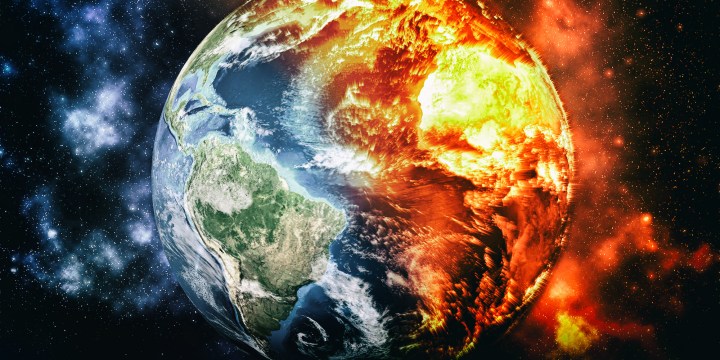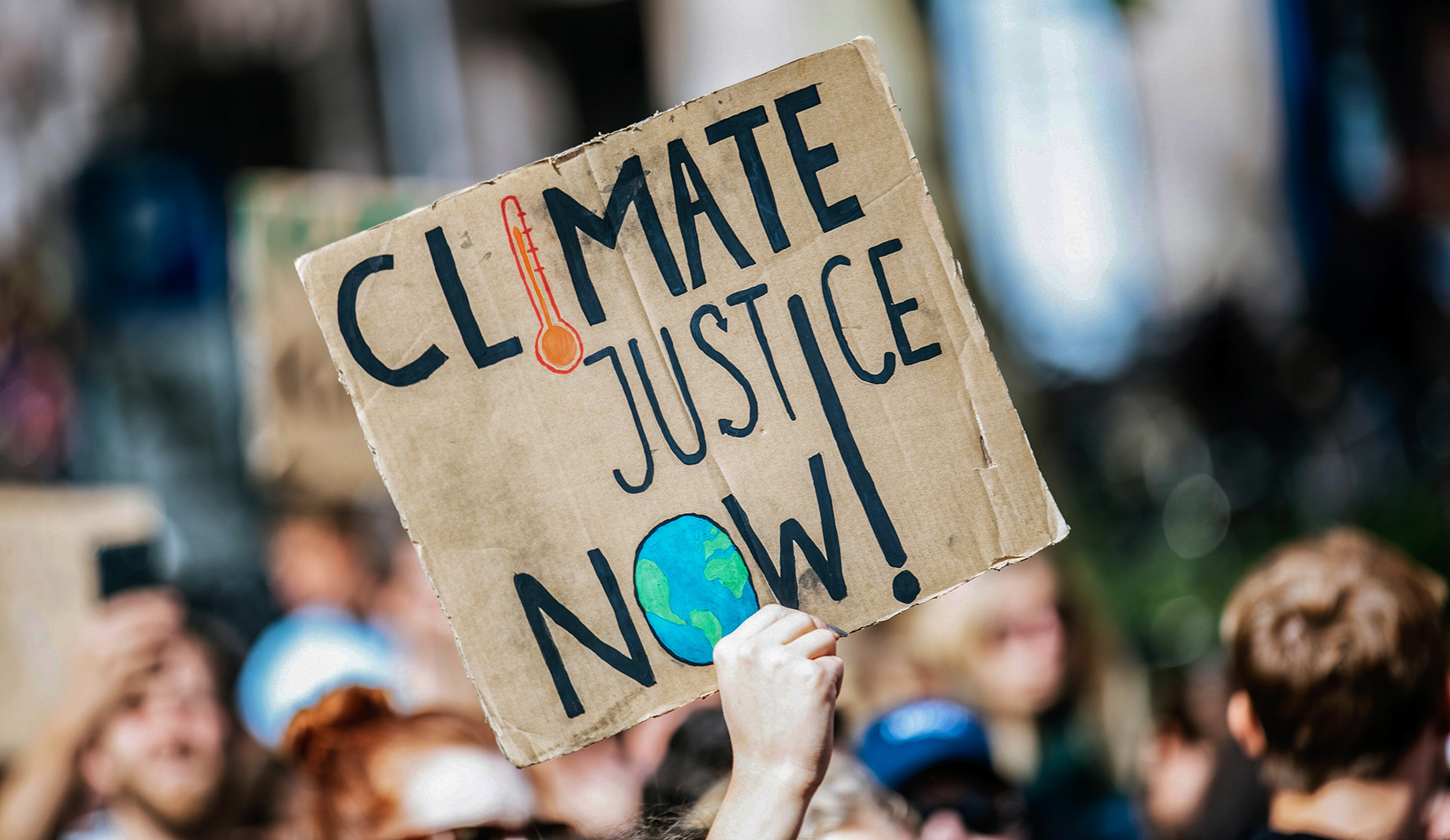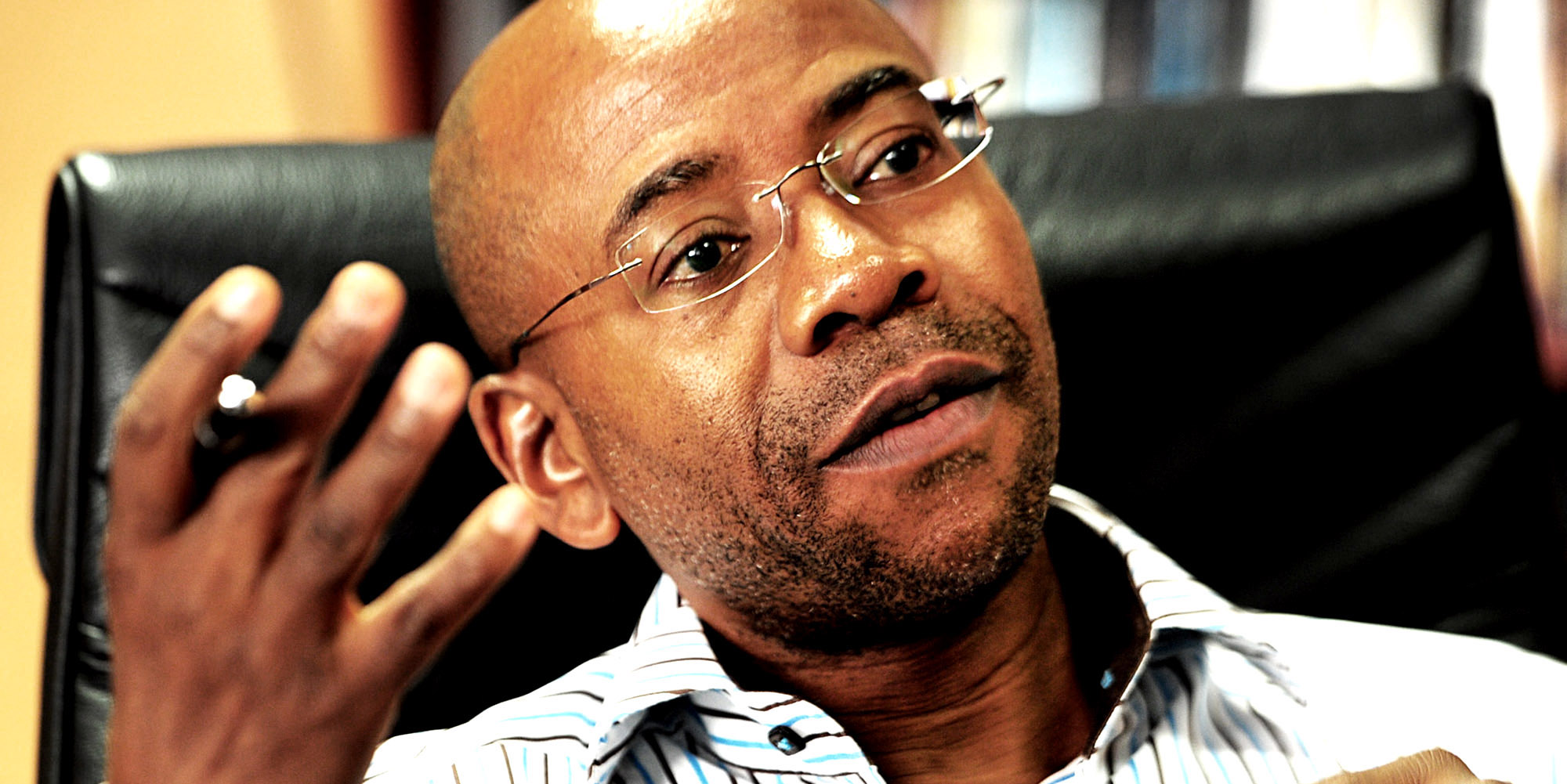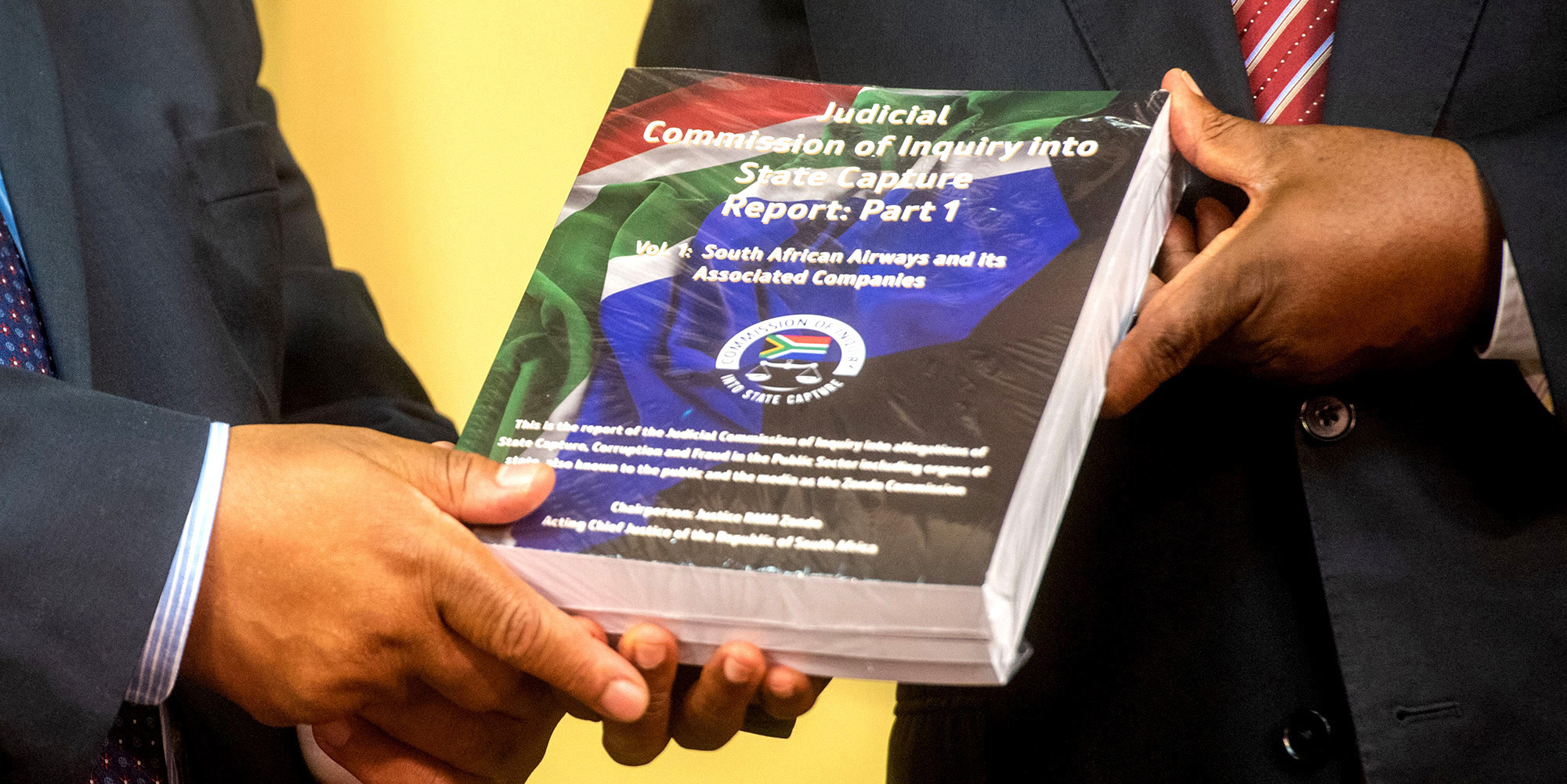A CLOCKWORK EARTH
How much time have we really got — five years?

The next few years pose a danger of rushing headlong into a series of converging crises that, if not recognised and overcome, will feed into each other and usher South Africa and the world into a dark place, where the constitutional freedoms we have become used to in our democracies — to protest, to freedom of speech and a free media, to vote — will no longer be available. That will make it much more difficult to challenge authoritarian power and organise ourselves out of a planetary crisis.
This year marks the 50th anniversary of a song by English singer David Bowie titled Five Years. The song is said to be based on a dream Bowie had. It invokes the singer’s emotions following a public announcement where:
“News had just come over
We had five years left to cry in (cry in)
News guy wept and told us
Earth was really dying … .”

(Photo: tpt.org/Wikipedia)
In a crescendo of rising hysteria, the chorus of the song repeats the refrain “five years, that’s all we’ve got”, until the song deflates to an abrupt and resigned end.
Back in 1972, David Bowie didn’t intend his song to be prophetic. It was glam rock meets dystopia. It was Ziggy Stardust, art and imagination, dressed up in pop theatre. Unbeknown to Bowie though, the first scientific warnings about a pending climate crisis caused by human activity had been made in 1968, but overlooked. He didn’t know then, and neither did we that, maybe, the “Earth was really dying”.
But in 2022, 50 years later, it’s suddenly not science fiction to ask “how long have we got?”; how much time is left to try to pull back our societies from a clutch of irreversible catastrophes?

Business has shown in its quarter-hearted response to the climate crisis that it can only unleash visionary thinking when seeking profits. (Photo: Markus Spiske / Unsplash)
That, probably, was one of the messages of the hit film Don’t Look Up, the harsh satire about political responses to the climate crisis. Was it because it touched a raw nerve that Don’t Look Up was Netflix’s number one in 90 countries across the world in December 2021, clocking up 152 million viewing hours in just one week alone?
(As an aside, Netflix now has more than 150 million subscribers worldwide).
There is a danger that we are now rushing headlong into a series of converging crises that, if not recognised and resisted, will feed into one another and usher South Africa and the world into a dark place, where the constitutional freedoms we have become used to in our democracies — to protest, to freedom of speech and a free media — will no longer be available to us to try to challenge power and organise ourselves out of the crisis.
The five most notable of these crises are:
- The climate crisis and global heating; in 2022 it is predicted thatCO2 emissions will be the highest yet. Nature’s best efforts to warn us of a world that is short-circuiting, including unprecedented lightning over the Arctic, are largely ignored in practice.
- The environmental crisis; this is most evident in the loss of biodiversity: one million, or one in four, species are threatened with extinction, according to a 2019 report from the Intergovernmental Science-Policy Platform on Biodiversity and Ecosystem Services.
- The crisis of poverty and inequality; Covid-19 has thrown hundreds of millions more people into poverty. At the same time, the ultra-rich have got richer, with 10 men amassing an extra $1.3-billion a day and increasing their political purchasing power.
- Inequality is fuelled by the crisis of kleptocracy and corruption. In his 2020 book Kleptopia, Patrick Berger from the UK Financial Times calls out the role of banks and reports how “As the richest 1% came to amass a quarter of all increases in incomes — leaving the bottom 50% with less than a tenth — the amount of money stashed offshore grew to $7.6-trillion”. But kleptocracy is also a crisis of democracy, state purchase (as opposed to State Capture) is a repudiation of the very idea of representative government. According to Berger, to the ultra-rich, “what mattered was that the money moved to a special place, a place beyond the reach of governments, of the law, of society”.
- And now we witness a new era of growing political tension and possibly war between hybrids of ultra-capitalist kleptocracies and oligarchies, post ideology, and none of them even superficially committed to social justice. In the words of The Guardian, “the geopolitical world order is again being reshaped”. This is already turning attention and resources away from the ticking time bombs I have described above.
These crises, although not given historical nomenclature like “world wars”, have reshaped society and politics as much as the great conflagrations of the 20th century.
All in all, it’s not a pretty picture.
Each crisis overlaps; each feeds the other; each is having and will have a deleterious effect on political democracy and civilisation, starting at the level of the community, but working its way up to threaten the viability of nation states and the erosion of democracy. We have already seen societies where this has happened: Syria, Sudan, Kazakhstan. The list grows …

SA already has the trappings of a failed state, says Chancellor of the University of the Free State Bohang Mohale. (Photo by Gallo Images / City Press /Leon Sadiki)
South Africa, too, is not exempt from this risk. Our county is a petri dish with all the ingredients for an imminent collapse and conflagration. According to Bonang Mohale, SA already has the trappings of a failed state: perhaps Mohale has had sight of a confidential report produced for the Consumer Goods Council of SA which predicts state failure in SA by 2030, noting that:
“The nature of a failed state is that past a certain point it accelerates and becomes difficult to reverse.”
The genesis and much of the responsibility for these crises must be placed at the door of neoliberal economics and statecraft, that point nearly 40 years back when governments in the developed world adopted an ideology that allowed the rich to pursue naked self-interest and withdrew from what were considered responsibilities to the welfare of their citizens.
But these days any hack can diagnose a crisis… it’s another to fix it.
Striving for social justice: ‘It cannot be the same as before’

(Photo: Alet Pretorius)
In Part 1 of his report on State Capture, Justice Raymond Zondo concludes the section on public procurement by lamenting that so much of the effort to counter corruption “could have been so ineffectual”. Zondo concludes: “Clearly a new approach is required, it cannot be the same as before.”
Zondo is talking about the radical steps he believes are now needed to stop state pilfering. But the same words could be applied to the fight against inequality.
Who is going to fix this mess? Sadly, we can say that it won’t be governments. Most have been captured and disabled. Business has shown in its quarter-hearted response to the climate crisis that it can only unleash visionary thinking when seeking profits.
Thus it is that civil society — organised citizens — is repeatedly referenced as the last line of democracy. But if civil society is going to rise to the task it too needs an urgent introspection. Why? Because myriad civil society organisations play a positive role all over the world, but nowhere are they bringing about the system change that is needed. Like King Lear, civil society huffs and puffs, but much of its advocacy and action ends up being performative.
These days, governments budget for civic protest (sometimes literally), just as the bad corporations budget for paying bribes or fines for corruption.
Incrementalism has run out of road. Despite all the effort and outrage, inequality is getting worse: thus, to return to Zondo, “a new approach is required, it cannot be the same as before”.
With an awareness of the clock ticking, some of the changes civil society needs to make are:
- To do more to work together rather than in artificial funder-determined silos that ignore how the many issues we deal with intersect;
- To galvanise people behind a sustained campaign for the society we want and have the resources to build, rather than limiting ourselves to reaction and critique;
- To work hand in hand with honest politicians and public servants at rebuilding a capable state;
- Coalescing as broad a group as possible around an ethical programme to bring about the priorities of a just transition; particularly tackling hunger, unemployment, education;
- To make more effort to work within and be led by poor communities, rather than working as part of the elite enclave; and
- Re-establishing the interests of the poor and the planet as the lodestar of all activism and government and embracing the same willingness to take risks that once upon a time was a feature of the struggle for democracy.
These are just headlines to provoke a discussion. Activism has to start in your own backyard and radiate outwards.
So, how much time have we got? Maybe a bit more than Bowie’s five years… but probably not much more. DM/MC





















 Become an Insider
Become an Insider
Most of what is said here is blatantly obvious and has been known for a long time but what needs to be said and debated is what is not already common knowledge. For instance, why is the report compiled for the Consumer Goods Council of SA not made public so that the issues can be debated in an effort to head off total failure. It seems to me that commentators on the county becoming a failed state seem to under estimate the impact that it would have on the entire country. We need to cut down on the emotions and have far more sensible debate on the issue. When in doubt about our future we need to watch the money flows and the flow definitely seems to be outward right now.
I don’t think the people researching the progress toward being a failed state are ignoring how this will affect people they just haven’t been heard yet or taken seriously. It is becoming noticeable and smart money is moving from what I notice.
The “smart” monies caused a lot of the trouble in the first place and now, a’ la Guptas, are leaving. South Africans need to get up off their couches of despair and get their asses into gear fighting for proper governance across the land. Governance, in the words of the late David Fuller, is everything. Our government has failed us, our parliament has failed us, only the judiciary is still with us, and who knows how long that will last. We need citizen lawfare across the land for governance NOW while the judiciary is still there for us.
the Question is will more economic pain and there is more on the way, lead to people in the majority wanting good governance or a quick fix and what will the political parties offer?
‘Our government has failed us’. Of course, that’s why we are even talking about the possibility of a failed state.
How? What do we as ordinary citizens need to do exactly? Someone, or some group, needs to spearhead a step-by-step approach otherwise the inaction will continue.
What I was alluding to in the first comment is that there are some very smart people working for various think tank organisations that could offer a lot of input on this. I’m thinking of someone like Dr Greg Mills at the Brenthurst Foundation. Colin Coleman could offer a more left wing view. We simply can’t trust anything that comes from government.
Why is it that those countries that pursue ‘neo-liberal economics’ are on the whole the most advanced in their climate change mitigation programmes, are least threatened by bio-diversity decline and extinction, suffer less extreme poverty and are most responsive to the concerns of ‘civil society’?
In many cases they ‘appear’ to be the ‘most advanced’, but their dirty secret is that they shift the evils offshore. The US is the paramount example. The lifestyle of an average citizen is unsustainable but, once achieved, is almost impossible to pull back. Humanity tends to selfishness & greed, a key trait that neo-liberal economic thought latches onto. We just have to look at the results & consequences of 60 years of neo-liberal economic supremacy: the greatest disparity in wealth distribution ever & a planet in desperate decline.
Exactly
It gets worse. There are other drivers of collapse out there. Notably energy and fossil fuels.
All pretty much over and done by 2050
I find it inconceivable that much can be achieved in spite of the ANC in government. If they return as part of a governing coalition in 2024, all will be lost. The answer has to somehow involve oppositional politics.
THE single most important change civil society needs to make… stop breeding.
That too.
Unfortunately that is taboo !!! Nothing was discussed about population growth at the COP meeting in Glasgow. Outdated cultural traditions and religions prohibit birth control and the world population grows by 100 million per year. Most of the population growth is in third world countries where the effects of climate change are most pronounced. We are going to see hundreds of millions of refugees from these countries fleeing from heatwaves, droughts, lack of water, extreme storms and sea level rise. Without addressing the fundamental problem of too many people we are just putting fingers in the dyke.
Population growth is a major issue but it can’t be ignored
That developed countries produce on average 50-100 times co2 per capita than the developing world
Hear hear!
You had me at:
“To work hand in hand with honest politicians and public servants at rebuilding a capable state.”
…find this handful of mythical creatures and we could be on to something.
Unicorns!
It was Churchill who said “never let a good crisis go to waste” and “a man standing in bucket cannot lift himself out of a hole”, both pithy but true. The current outside world assistance is simply pouring gold into the bucket, which does not help at all. Business South Africa must make a definite action agenda not just wait for a lost government to think up the next unworkable spending plan. The action must include a plan to divert money to resolving the crisis instead of adding to the bucket. Business must create private initiatives for employment in every tax-deductible way to end the culture of dependence, fix the roads, fix the water, generate the electricity, when people have jobs, work and income they see light in the tunnel.
Very well said. Presently too many of the masses appear to be only too eager to hand power to populist leaders without considering those leaders’ ability and willingness to fix the real problems. A new focus on ethics and active resistance by society to unethical policies and behaviours are desperately needed.